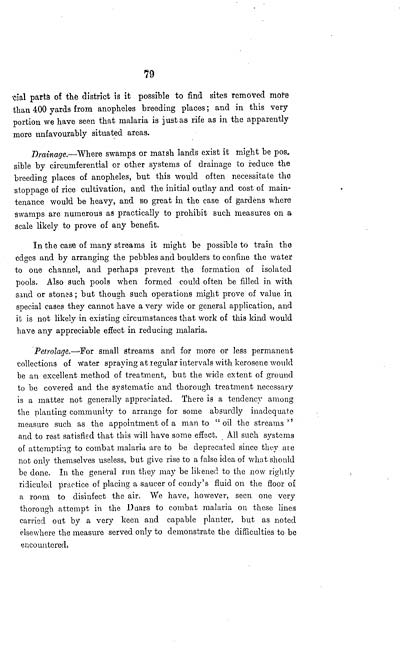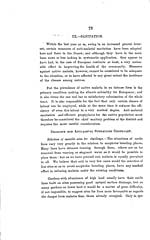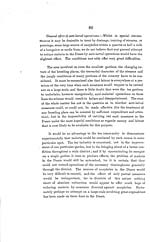Medicine - Disease > Malaria in the Duars
(91) Page 79
Download files
Individual page:
Thumbnail gallery: Grid view | List view

79
cial parts of the district is it possible to find sites removed more
than 400 yards from anopheles breeding places; and in this very
portion we have seen that malaria is just as rife as in the apparently
more unfavourably situated areas.
Drainage.-Where swamps or marsh lands exist it might be pos-
sible by circumferential or other systems of drainage to reduce the
breeding places of anopheles, but this would often necessitate the
stoppage of rice cultivation, and the initial outlay and cost of main-
tenance would be heavy, and so great in the case of gardens where
swamps are numerous as practically to prohibit such measures on a
scale likely to prove of any benefit.
In the case of many streams it might be possible to train the
edges and by arranging the pebbles and boulders to confine the water
to one channel, and perhaps prevent the formation of isolated
pools. Also such pools when formed could often be filled in with
sand or stones; but though such operations might prove of value in
special cases they cannot have a very wide or general application, and
it is not likely in existing circumstances that work of this kind would
have any appreciable effect in reducing malaria.
Petrolage.-For small streams and for more or less permanent
collections of water spraying at regular intervals with kerosene would
be an excellent method of treatment, but the wide extent of ground
to be covered and the systematic and thorough treatment necessary
is a matter not generally appreciated. There is a tendency among
the planting community to arrange for some absurdly inadequate
measure such as the appointment of a man to "oil the streams"
and to rest satisfied that this will have some effect. All such systems
of attempting to combat malaria are to be deprecated since they are
not only themselves useless, but give rise to a false idea of what should
be done. In the general run they may be likened to the now rightly
ridiculed practice of placing a saucer of condy's fluid on the floor of
a room to disinfect the air. We have, however, seen one very
thorough attempt in the Duars to combat malaria on these lines
carried out by a very keen and capable planter, but as noted
elsewhere the measure served only to demonstrate the difficulties to be
encountered.
cial parts of the district is it possible to find sites removed more
than 400 yards from anopheles breeding places; and in this very
portion we have seen that malaria is just as rife as in the apparently
more unfavourably situated areas.
Drainage.-Where swamps or marsh lands exist it might be pos-
sible by circumferential or other systems of drainage to reduce the
breeding places of anopheles, but this would often necessitate the
stoppage of rice cultivation, and the initial outlay and cost of main-
tenance would be heavy, and so great in the case of gardens where
swamps are numerous as practically to prohibit such measures on a
scale likely to prove of any benefit.
In the case of many streams it might be possible to train the
edges and by arranging the pebbles and boulders to confine the water
to one channel, and perhaps prevent the formation of isolated
pools. Also such pools when formed could often be filled in with
sand or stones; but though such operations might prove of value in
special cases they cannot have a very wide or general application, and
it is not likely in existing circumstances that work of this kind would
have any appreciable effect in reducing malaria.
Petrolage.-For small streams and for more or less permanent
collections of water spraying at regular intervals with kerosene would
be an excellent method of treatment, but the wide extent of ground
to be covered and the systematic and thorough treatment necessary
is a matter not generally appreciated. There is a tendency among
the planting community to arrange for some absurdly inadequate
measure such as the appointment of a man to "oil the streams"
and to rest satisfied that this will have some effect. All such systems
of attempting to combat malaria are to be deprecated since they are
not only themselves useless, but give rise to a false idea of what should
be done. In the general run they may be likened to the now rightly
ridiculed practice of placing a saucer of condy's fluid on the floor of
a room to disinfect the air. We have, however, seen one very
thorough attempt in the Duars to combat malaria on these lines
carried out by a very keen and capable planter, but as noted
elsewhere the measure served only to demonstrate the difficulties to be
encountered.
Set display mode to: Large image | Zoom image | Transcription
Images and transcriptions on this page, including medium image downloads, may be used under the Creative Commons Attribution 4.0 International Licence unless otherwise stated. ![]()
| India Papers > Medicine - Disease > Malaria in the Duars > (91) Page 79 |
|---|
| Permanent URL | https://digital.nls.uk/74558792 |
|---|




